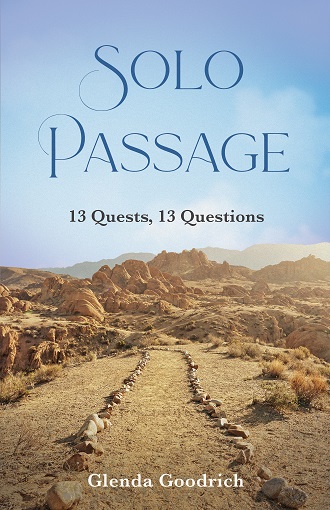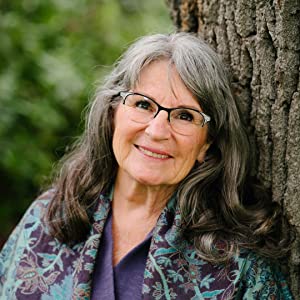Amazingly, even after twenty years I could still vividly see in my mind the details of the rocks, plants and land where I spent my solo fasting time on my quests.
Glenda Goodrich – 26 September 2023
The Back Flap
In her search to find healing and meaning in midlife, Glenda Goodrich undertakes a series of wilderness quests into the backcountry of Oregon, Washington, and California to discover what the natural world has to teach her about life, death, happiness, spirituality, and forgiveness.
This book chronicles the sacred ceremonies that connected Goodrich to the land, wove her into nature’s web, and transformed her from a woman who worked to please others into a woman who forged her own path. It is a brilliant collection of adventures—the touch of coyote fur, a snake’s kiss, a ceremonial blood offering—and a profound reflection on the healing and restorative power of nature.
About the book
What is the book about?
Solo Passage: 13 Quests, 13 Questions is a book about the healing and restorative powers of nature illustrated through thirteen quests I participated in over a twenty-year period.
Wilderness questing, also known as vision questing or vision fasting, is a centuries-old rite of passage intended to awaken personal vision and purpose. It is an act of courage and determination that involves solitude, fasting, exposure, a ceremonial descent to the underworld and a rite of initiation where seekers die to the familiar way of belonging and return with greater clarity of their soul’s purpose and place in the world. My book is a collection of stories about how time alone in nature and the ceremony of wilderness questing helped me circle back to the events of my life and sort through them, find deeper meaning, and make peace with my past.
When did you start writing the book?
In 2015, I attended a week-long writing retreat on Whidbey Island, Washington, with Christina Baldwin, author of Story Catcher. I was just beginning to think about writing down my questing experiences but didn’t consider myself a real writer, so writing a book seemed too lofty a goal. The story I wrote on that retreat turned out to be part of the first chapter of my book.
How long did it take you to write it?
It took six years to write the book. I studied at a professional writing studio for three years to learn more about the craft of writing, then worked one-on-one for two years with a developmental editor who also happened to be a vision quest guide, so she understood the wilderness questing ceremonies and experiences I was writing about.
Where did you get the idea from?
During one of my wilderness quests (the chapter in my book is titled “Finding My Medicine Name”), I was meandering along a path by a small creek and the notion to write down my stories came through loud and clear, seemingly from out of nowhere. I now realize it was a calling of sorts, like a beckoning from something or someone greater than myself. The spirit of the muse was knocking on my door and, thankfully, I had the wisdom and courage to open the door and let her in.
Were there any parts of the book where you struggled?
Yes. Writing about past regrets—ways I hurt myself and others and how others hurt me—was difficult. There were days I could only write a few sentences before I had to take a break and shed tears. I remembered the words from my writing teacher, no tears for the writer, no tears for the reader. There were some things I left out because, although they were true, they didn’t serve the story and were potentially too damaging to those involved. I had to carefully consider what legacy stories I wanted to leave for my descendants.
What came easily?
Describing the beauty of wild places and wild beings was a joy. Each time I wrote about places I quested and the earth’s beings that joined me there I relived the experience. Amazingly, even after twenty years I could still vividly see in my mind the details of the rocks, plants and land where I spent my solo fasting time on my quests.
Are your characters entirely fictitious or have you borrowed from real world people you know?
All my characters are real world people, including all the trees, plants, animals, insects, and reptiles that showed up on my wilderness quests.
We all know how important it is for writers to read. Are there any particular authors that have influenced how you write and, if so, how have they influenced you?
My favorite author is Terry Tempest Williams. I love how she writes about her connection to land and nature and her books usually include an educational facts-based aspect that teaches me about the importance of saving wild places and leaves me inspired to go out and find my own sense of place. I also love Kathleen Dean Moore, Robin Wall Kimmerer, and Barbara Kingsolver for some of the same reasons.
Do you have a target reader?
People who enjoy reading about nature, spirituality, and midlife transitions, as well as grandparents and people who are curious about vision questing.
About Writing
Do you have a writing process? If so can you please describe it?
I write for an hour or two first thing in the morning while I am fresh and before I get caught up in daily life.
Do you outline? If so, do you do so extensively or just chapter headings and a couple of sentences?
After I finished the first draft of my book, I made a spreadsheet with chapter themes, signs/symbols/omens from nature, lessons learned (this related to the 13 questions referred to in my title), and the artwork that I had created after each quest. I came up with title: Solo Passage, 13 Quests, 13 Questions, then had to go back in and revise each chapter and clearly identify each of the 13 questions.
Do you edit as you go or wait until you’ve finished?
Ah yes, editing. I was warned by my writing teachers not to try to edit as you go because it’s a total distraction from getting the story out onto the page. In order to satisfy my urge to get things right, I’d let myself do some preliminary editing once I got the story out. Then I’d learn about things along the way, like “weasel words” and over-using degree adverbs (words that end in “ly”) and I’d go through and edit again and again.
Did you hire a professional editor?
Yes, absolutely. I hired a developmental editor and a copy editor and I’m so glad I did.
Do you listen to music while you write? If yes, what gets the fingers tapping?
No. I prefer quiet while I’m writing.
About Publishing
Did you submit your work to Agents?
No.
What made you decide to go Indie, whether self-publishing or with an indie publisher?
I wasn’t sure how I would get my book published. I didn’t want to spend the time and emotional energy looking for an agent. I’d heard too many horror stories about agents asking for big changes to books to make them more sellable or dragging authors along for months and then dropping them at the last minute. I signed up for a memoir class with She Writes Press and the mentor I worked with suggested I could consider hybrid publishing. I looked into it and liked the idea of not having to wait years to get my book published as well as having a professional publisher show me the way. She Writes Press had published a friend’s book and she spoke very highly of their ethics and generous royalty program. So I went with She Writes Press, and I’m so glad I did. I’ve learned so much.
Was it a particular event or a gradual process?
See above.
Did you get your book cover professionally done or did you do it yourself?
She Writes Press designed my book cover and I love it.
Do you have a marketing plan for the book or are you just winging it?
I am working with BookSparks on a publicity campaign and also doing some marketing on my own. I am an artist and art doula, so I have an email list and a social media presence.
Any advice that you would like to give to other newbies considering becoming Indie authors?
If you want to keep the momentum up and get your book out there, don’t get dragged down by jumping through the hoops required to find an agent and beg for your book to get published. With independent self or hybrid publishing you have greater control. Your book can stand as your truth and your story, not someone else’s idea of what will sell. It was more important to me that my book get into the hands of people who might benefit from reading about the healing and restorative powers of nature than it was to try to become a best seller.
About You
Where did you grow up?
I grew up in a suburb in the east bay area across from San Francisco in a city called Richmond.
Where do you live now?
I live in a cottage in the Willamette Valley, Oregon.
What would you like readers to know about you?
As an artist, art doula, SoulCollage® facilitator, writer, and convener of ceremony, I bring together earth-based rituals, community gatherings, and creative expression in a search for new ways to show love for the Earth. My greatest joy is exploring wild places and spending time with my two children, three grandchildren, and four great-grandchildren.
What are you working on now?
I am working on a couple of essays; one is about falling in love with mountains and the other is about finding tribes of like-minded, like-hearted women who have become my touchstone in life.
End of Interview:
For more from Glenda Goodrich visit her website and follow her on Facebook, Instagram and Twitter.


